|
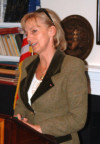 4/16/2007
- Dr. Ibolya David, head of the Hungarian Democratic Forum
(MDF / Magyar Demokrata Fórum) discusses current political affairs
in Hungary. In an event hosted by the Hungarian Reformed Federation
and co-sponsored by the American Hungarian Federation (AHF) and the Hungarian
American Coalition, Dr. David addressed concerns expressed by the organizing
committee ranging from US-Hungarian bilateral relations to the Hungarian
government's energy policy and relations with Russia. 4/16/2007
- Dr. Ibolya David, head of the Hungarian Democratic Forum
(MDF / Magyar Demokrata Fórum) discusses current political affairs
in Hungary. In an event hosted by the Hungarian Reformed Federation
and co-sponsored by the American Hungarian Federation (AHF) and the Hungarian
American Coalition, Dr. David addressed concerns expressed by the organizing
committee ranging from US-Hungarian bilateral relations to the Hungarian
government's energy policy and relations with Russia.
AHF has been sponsoring a series of political discussion
forums featuring representatives from various political parties in Hungary.
Last year AHF hosted Dr. Horvath Janos
(discussing voting rights); and Nemeth Zsolt (Fidesz) and Szabo Vilmos
(MSZP) who debated the political crisis due to remarks by Prime Minister
Gyurcsany.
 It
was standing room only as almost 70 people came to the HRFA Kossuth house
in Washington, D.C. Guests included AHF and HAC
leadership, HRFA Board Members, representatives
from the US Embassy in Budapest, Ambassador Simonyi
and his staff from the Hungarian Embassy. It
was standing room only as almost 70 people came to the HRFA Kossuth house
in Washington, D.C. Guests included AHF and HAC
leadership, HRFA Board Members, representatives
from the US Embassy in Budapest, Ambassador Simonyi
and his staff from the Hungarian Embassy.
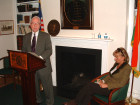 AHF
Co-President (and HRFA
President) Gyula Balogh gave the opening remarks
while the Coalition's Edit Lauer welcomed Dr. David. AHF Co-President
Zoltan Bagdy was the moderator during questions
and answers. A reception followed. Magyar Nemzet Online published an article
seen on the right. AHF
Co-President (and HRFA
President) Gyula Balogh gave the opening remarks
while the Coalition's Edit Lauer welcomed Dr. David. AHF Co-President
Zoltan Bagdy was the moderator during questions
and answers. A reception followed. Magyar Nemzet Online published an article
seen on the right.
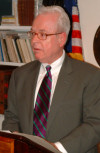 Dr.
David has now been leader of the Hungarian Democratic Forum for five terms
in office, making her the longest-serving party leader. During
the mass demonstrations against Prime Minister Ferenc Gyurcsany
over his admitting lying to win the elections, Dr. David said that he
should "withdraw from public life." Dr.
David has now been leader of the Hungarian Democratic Forum for five terms
in office, making her the longest-serving party leader. During
the mass demonstrations against Prime Minister Ferenc Gyurcsany
over his admitting lying to win the elections, Dr. David said that he
should "withdraw from public life."
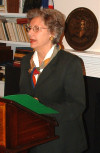 In
a recent poll in Hungary conducted by Szazadveg and Forsense on April
10, 2007, Prime Minister Ferenc Gyurcsany is the last of 19 politicians
gauged for popularity. Among decided party voters Fidesz has 52% support,
as against 36% for the Socialist Party, 6% for the Democratic Forum and
4% for the Free Democrats. Some 61% of respondents said they are dissatisfied
with the state of democracy in Hungary. In
a recent poll in Hungary conducted by Szazadveg and Forsense on April
10, 2007, Prime Minister Ferenc Gyurcsany is the last of 19 politicians
gauged for popularity. Among decided party voters Fidesz has 52% support,
as against 36% for the Socialist Party, 6% for the Democratic Forum and
4% for the Free Democrats. Some 61% of respondents said they are dissatisfied
with the state of democracy in Hungary.
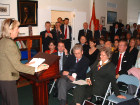 “Hungary
is at a crossroads again, just as it happened 17 years ago – it
will be soon determined whether the country will take the path toward
a real civil society or the path toward balkanization, whether Hungary
will become a full-fledged democracy or a banana-republic,” said
David in her opening remarks. She deplored the current political situation
in the country, characterized by deep divisions and the tendency to “…divide
the country into ‘good’ and ‘bad,’ black and white.”
Those who favor a model of a civil society are opposed to such divisions,
and work toward uniting, instead of dividing the nation, she said. “Hungary
is at a crossroads again, just as it happened 17 years ago – it
will be soon determined whether the country will take the path toward
a real civil society or the path toward balkanization, whether Hungary
will become a full-fledged democracy or a banana-republic,” said
David in her opening remarks. She deplored the current political situation
in the country, characterized by deep divisions and the tendency to “…divide
the country into ‘good’ and ‘bad,’ black and white.”
Those who favor a model of a civil society are opposed to such divisions,
and work toward uniting, instead of dividing the nation, she said.
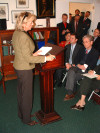 David
explained that in 1990 she looked toward the future with unbridled optimism,
and believed that “once they remove the handcuffs from our hands…Hungary
will build a better world.” Unfortunately, things didn’t work
out quite that way. While the late prime minister Jozsef Antall managed
well Hungary’s orientation to the West, the country has little to
show for in this period of about 17 years because Hungarian politicians
are mired into an endless game of political posturing that prevents much
needed governance. David
explained that in 1990 she looked toward the future with unbridled optimism,
and believed that “once they remove the handcuffs from our hands…Hungary
will build a better world.” Unfortunately, things didn’t work
out quite that way. While the late prime minister Jozsef Antall managed
well Hungary’s orientation to the West, the country has little to
show for in this period of about 17 years because Hungarian politicians
are mired into an endless game of political posturing that prevents much
needed governance.
This means that Hungary does not have currently an energy policy, the
passage of laws is delayed and obstructed by the hurdle of having to pass
with a two third majority creating a bottleneck in the legislative agenda.
The root of the problem according to Dr.David is the absence of political
dialogue, unwillingness to compromise by the major parties and to reach
across the isle.
In 2006 it became painfully clear that for the major parties, Fidesz
and MSzP, winning the elections at all costs was the only goal thereby
following the motto: “the end justifies the means.” In this
context, both parties made unrealistic promises to the electorate in a
bidding race to woo the favor of voters without regard to the budgetary
realities of the increasingly struggling Hungarian economy.
David called for the defeat of the current government, and reported that
the support and popularity of MDF is on the increase and may reach the
level of 15% support in the coming years, providing the opportunity for
the party to significantly influence the make-up of the next government.
In the interest of the nation, she said, the two leading parties, FIDESZ
and the MSZP, need to “stop the needless division.”
In responding to a question about her discussions with American political
and governmental leaders during her current trip, Dr. David said those
who are familiar with the current political situation in Hungary agree
that unfortunately Hungary has not taken advantage of the opportunities
that were available during recent years.
 During
a long question and answer session, audience members posed questions about
the economy, Hungary’s energy policies, issues dealing with Hungarian
minorities, the country’s education policy, and recent demonstrations
during the October 23 commemorations. David’s response on the issue
of reversing Hungary’s economic debacle centered on efforts to reduce
the size of the government and balancing the national budget. With regard
to the October demonstration, she did not condemn police brutality and
appeared to blame the chaos on the protesters, many of whom were peaceful
and exercising their right to assemble and voice their grievances. In
general, Dr. David articulated her view of the failed policies of the
current administration but did not appear to describe MDF’s alternative
policies to the government’s bankrupt policies, including the government’s
dangerous relations with Russia which was noted by many of David’s
interlocutors. During
a long question and answer session, audience members posed questions about
the economy, Hungary’s energy policies, issues dealing with Hungarian
minorities, the country’s education policy, and recent demonstrations
during the October 23 commemorations. David’s response on the issue
of reversing Hungary’s economic debacle centered on efforts to reduce
the size of the government and balancing the national budget. With regard
to the October demonstration, she did not condemn police brutality and
appeared to blame the chaos on the protesters, many of whom were peaceful
and exercising their right to assemble and voice their grievances. In
general, Dr. David articulated her view of the failed policies of the
current administration but did not appear to describe MDF’s alternative
policies to the government’s bankrupt policies, including the government’s
dangerous relations with Russia which was noted by many of David’s
interlocutors.
[see ALL AHF news stories]
|  Nepszabdsag
Article: Nepszabdsag
Article:
Dávid Ibolya: Magyarország újra válaszút
elott
Ma ugyanolyan válaszút elott áll Magyarország
mint 17 évvel ezelott, rövid idon belül el fog dolni,
hogy az ország a valódi polgárosodás vagy
pedig a balkanizálódás útjára lép,
érett demokrácia vagy banánköztársaság
lesz - mondta Dávid Ibolya, az MDF elnöke a washingtoni Kossuth
Házban, ahol helyi magyarokkal találkozott.
MORE > http://nol.hu/cikk/443097/
Links:
 Sign
up for the AHF mailing list. Your information is not shared! Sign
up for the AHF mailing list. Your information is not shared!
Join online!

[see ALL AHF news stories]
|



